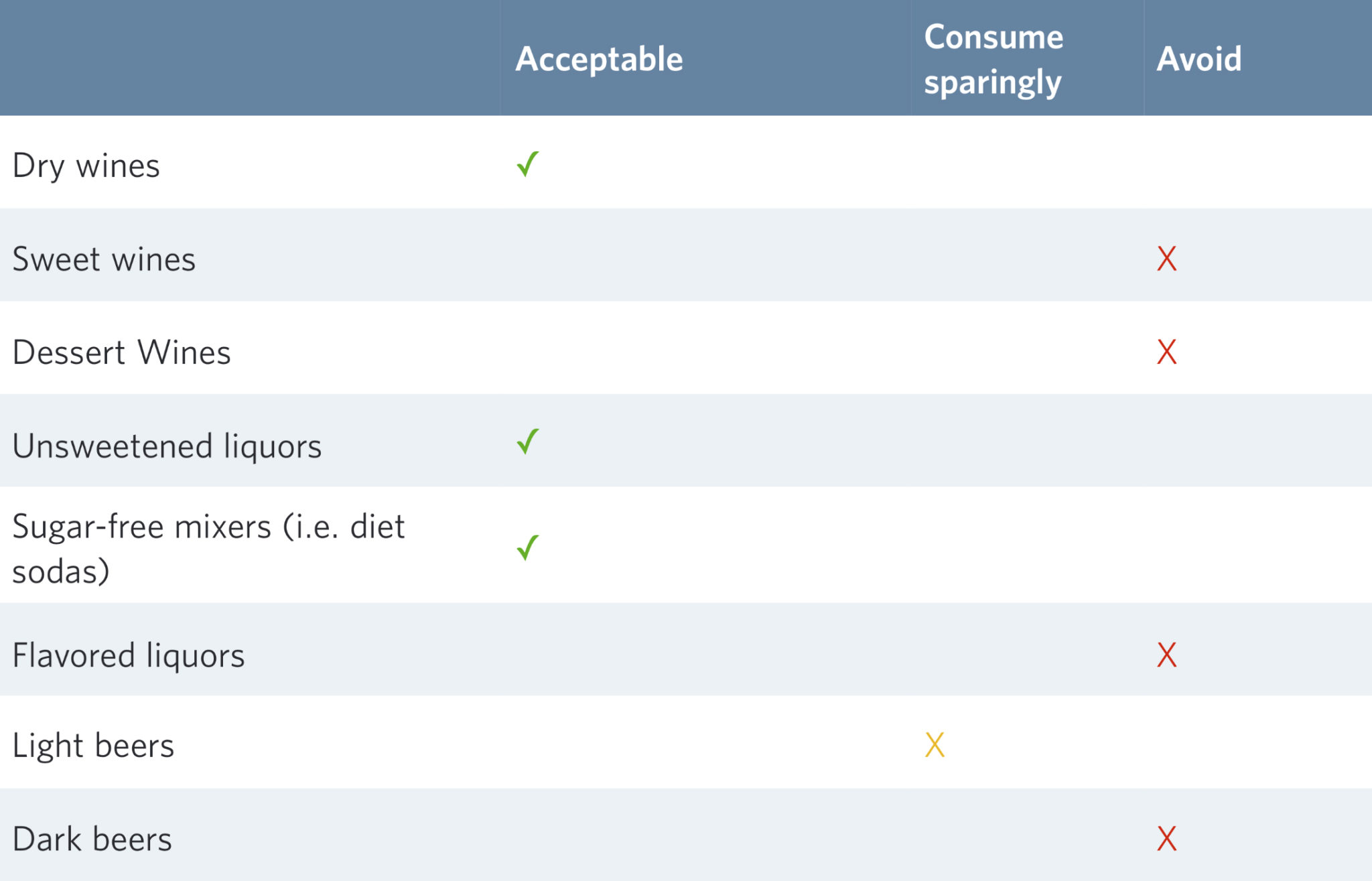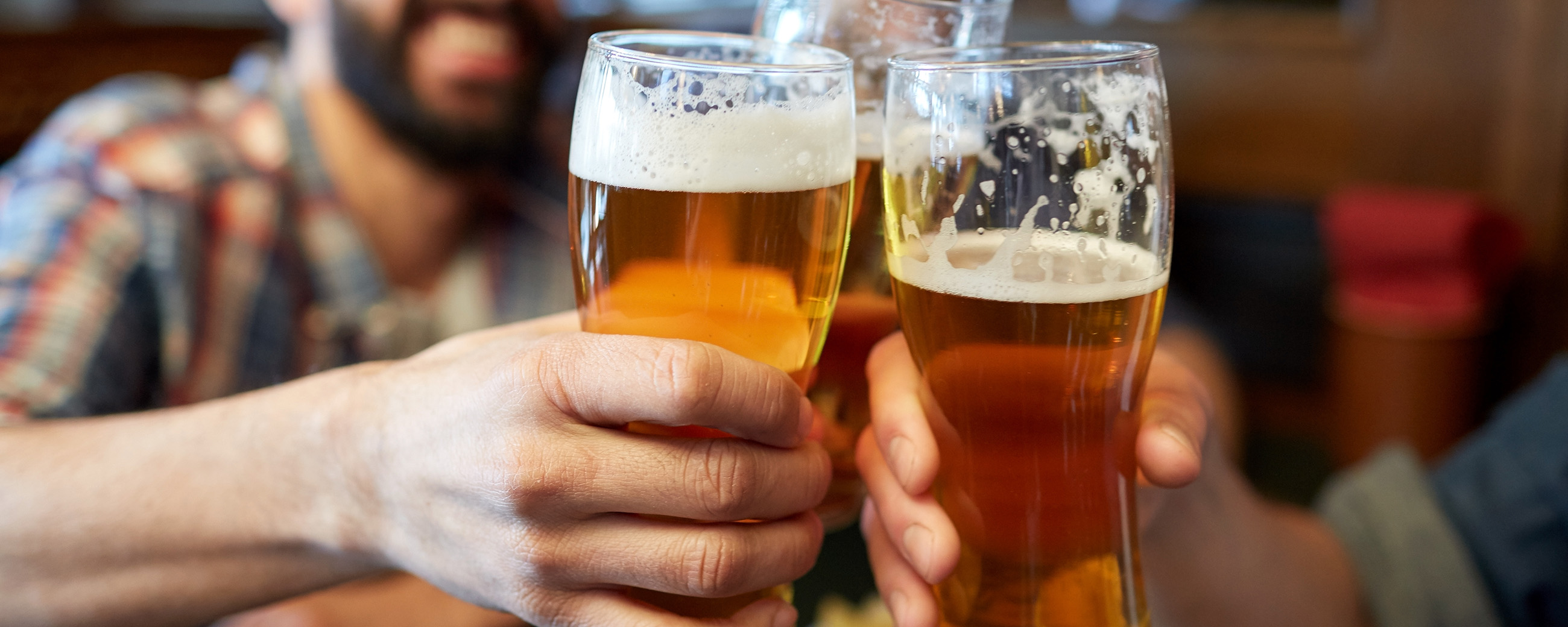
A Guide to Low Carb Alcohol: Beer, Wine and Cocktails

Alcohol can be enjoyed as part of your low carb lifestyle. As with most things, only add it if it’s right for you and make wise choices if you choose to fill your cup. Although alcohol provides calories, and sometimes carbs, without satiety, there are many low carb options that can be consumed in moderation. If you make sure to choose dry wines and spirits as well as sugar-free mixers, you can still enjoy low carb and keto-friendly variations of your favorite drinks, like a rum and diet coke or a Moscow Mule made with diet ginger beer.
Keto Wines, Spirits and Beers
Reference this chart to ensure you're on track.

Low Carb Wines

Acceptable low carb wines:
Opt for dry wines. These wines tend to have 1-2 grams of carbs per 5 ounces.
Although wine originates from sweet grape juice, which contains about 30 grams of sugar per 4 oz, yeast fermentation turns that sugar into alcohol— so a higher alcohol content means that more of the sugar has fermented into alcohol. Check the label and select wines of at least 12% alcohol by volume (ABV).
Here are some common dry wines (with roughly 1-2g carbs per 5oz):
- Cabernet Sauvignon
- Pinot Noir
- Chardonnay
- Sauvignon Blanc
- Chablis
- Zinfandel
Low carb wines you should avoid: Avoid dessert wines like ports, madeiras, sauternes, and most sherries. Because fermentation is stopped earlier, they tend to have a high sugar content. Riesling, sparkling wines and gewürztraminer can be dry or sweet, so be cautious with these varieties.
Low Carb Spirits and Specialty Cocktails
Acceptable low carb cocktails:The distilling process removes almost all of the sugar from the original mix. Consume it ‘straight’ or if you use a mixer, be sure it’s a sugar-free, low carb mixer. Here are some acceptable options when consumed straight:

- Rum
- Tequila
- Vodka
- Gin
- Whiskey (Bourbon, Rye, Scotch)
- Cognac and Brandy
You can drink your liquor straight, or you can use a sugar-free, low carb mixer such as:
- Diet soda
- Crystal Lite
- Diet tonic
- Club Soda or soda water
- Zero-calorie seltzers
- Iced tea (no sugar)
- Sugar-free juice
Here are a few of our favorite mixed drink recipes.



Low carb cocktails you should avoid:
Most flavored varieties of liquor (i.e., caramel vodka, kahlua, fireball) are high in sugar.
Low Carb Beer
Acceptable low carb beers:
‘Light-beer’ will provide 5-10 grams of carbs per 12-ounce serving. The lightest beers, like Michelob Ultra, provide 2-5 grams of carbs.
Low carb beers you should avoid:
Most beers should be avoided entirely or consumed minimally if you’re limiting your carbohydrate intake. Made from malted grains such as barley, rice, or wheat; beer contains varying amounts of carbs depending upon the amount of malted grain added and the extent of the fermentation. Most light-colored beers contain 12-15 grams of carbs per serving, and dark beers tend to contain considerably more.
Guidelines for Alcohol Consumption on a Low Carb or Ketogenic Diet
If you choose to enjoy alcohol as part of your low carb plan, follow these simple rules:
- Add alcohol only if if does not stall your weight loss or impact your metabolic health.
- Choose dry wines, champagnes, and spirits and (very) low carb beer. Remember to only mix with sugar-free options.
- Limit your consumption. Too many drinks can not only add up in calories from the alcohol but also limit your ability to steer clear of the dessert tray or reaching for snacks when you’re not hungry. Know the size of your pour and be aware of your limit!
This blog is intended for informational purposes only and is not meant to be a substitute for professional medical advice, diagnosis, or treatment. Always seek the advice of your physician or other qualified health provider with any questions you may have regarding a medical condition or any advice relating to your health. View full disclaimer
Are you living with type 2 diabetes, prediabetes, or unwanted weight?









